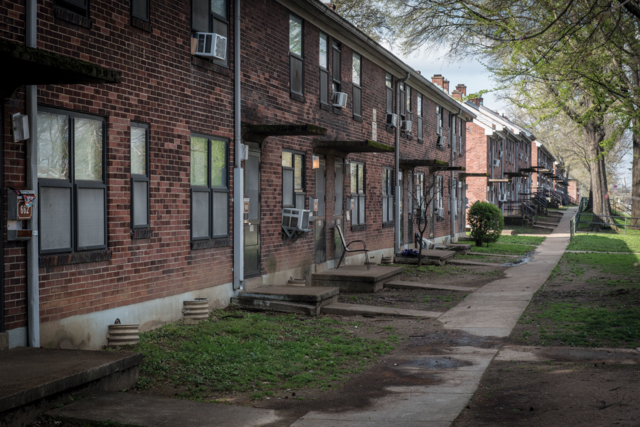
James A. Cayce HomesPhoto: Eric England
All across the United States, cities are debating what to do about public housing, much of which is old and in disrepair, but sitting on valuable land. There’s a $26 billion backlog of needed maintenance for public housing, according the most recent assessment done by the the U.S. Department of Housing and Urban Development in 2010 — a backlog that surely won’t be addressed soon.
In Nashville, one way the city is looking to renovate a piece of public housing is through a project called Envision Cayce — an effort that will bulldoze East Nashville’s James A. Cayce Homes public housing development, built in the 1940s and ’50s, and erect a mixed-income development in its place. Envision Cayce has been in the works since 2014, but every day the project gets closer to fruition, making residents there feel more and more on edge. Current Cayce inhabitants will be allowed to stay, according to the Metro Development and Housing Agency, but some of the units will also be rented out at market rate. It’s all part of a new wave of housing policy, in which public housing stock is being transferred to local housing authorities.

Meribah KnightPhoto: Daniel Meigs
You might be sensing that Envision Cayce sounds complicated and potentially problematic. Meribah Knight at local NPR affiliate WPLN sensed the same thing, which is why she and her editors decided a deep dive on Cayce might make for a compelling series of stories. They were right: Since WPLN’s podcast The Promise started in January, the station says it’s been listened to more than 200,000 times — averaging 30,000 listens per episode. People from all over the country — and from as far away as Argentina and Paraguay — are tuning in to see what will happen to the people in the Cayce housing project as their community endures rapid change.
In six episodes, Knight introduces several characters from the neighborhood, and in each episode she tells an individual story that fits into the larger narrative of what’s happening in Cayce.
Knight says it would have been easy to regurgitate some of the more sensational stories about what happens in Cayce — things like gun violence and the 2017 police shooting of Jocques Clemmons, for instance. And while some of the episodes do focus on crime in Cayce, Knight knew there was much more to the neighborhood than that. Even so, she wasn’t sure people would listen to three hours of stories about a public housing project.
“We’re so used to these tantalizing podcasts — and this is just a really heavily reported, thought-out series,” says Knight. “I just didn’t know if people were going to want to listen to a whole series about this place.”
Knight had already been reporting on Cayce before the fatal shooting of Clemmons by police officer Josh Lippert last year. But she really dug into the community after that, realizing that there was a bigger story to be told there — a story that could say something about greater Nashville.
“It became really clear that Cayce was a place that really was kind of ground zero for some of the major issues in the city,” says Knight. “And it was also a narrative that we weren’t really hawking, because it wasn’t a great one. It was the other side of the growth. I mean, literally, it was the place in the shadow of these big skyscrapers. So it was like, ‘OK, we can’t talk about being the ‘It City,’ we can’t talk about having all these people move here every day without talking about this kind of narrative.’ ”
Knight’s beat at WPLN since she started a couple years ago has been growth and development. And while there’s certainly enough meat there to produce daily stories, Knight says she’s always been drawn to and been better at longer, more in-depth reporting. Truth is, she’s damn good at both.
This project took a year of reporting, hours upon hours getting below the surface with Cayce residents, interviewing officials from MDHA and reviewing details about housing policy. Initially, Knight and her editors thought they might spend about three months on the series.
Knight says Cayce isn’t a place you can just parachute into. “You can’t just have a bunch of reporters show up and say, ‘I’ll do my piece,’ ” she says. “That just does a disservice to the place.”
It was a huge time investment for the station. In addition to Knight’s work, almost every other person at the station put in some amount of time on the series, whether through editing or sound design. WPLN also employed former Scene editor and current contributor Steve Cavendish to fact-check all six episodes.
Spending a lot of time in Cayce was important to Knight, because she wanted to be careful to find dynamic characters for the series without presenting people as stereotypes. “I was just so conscious of making something that was real and true, and I felt a great responsibility to make sure I got it right,” Knight says. “So I worried about that, I really worried about it. … Because the stakes are so high. Not for me professionally — sure, I’ve never done a podcast — but what happens to these people? What if I perpetuate the stereotypes all over again?”
The station is still exploring whether to carry The Promise into a second season, but WPLN will release a bonus episode toward the end of April. The fact is, the story of Envision Cayce isn’t over. With only initial phases of the project completed, the story is just beginning.
“This is just another city dealing with crumbling public housing stock — with gentrification,” Knight says. “And so it wasn’t that Nashville was the only place to tell this story, it’s that it was one of many places you could tell this story.”






